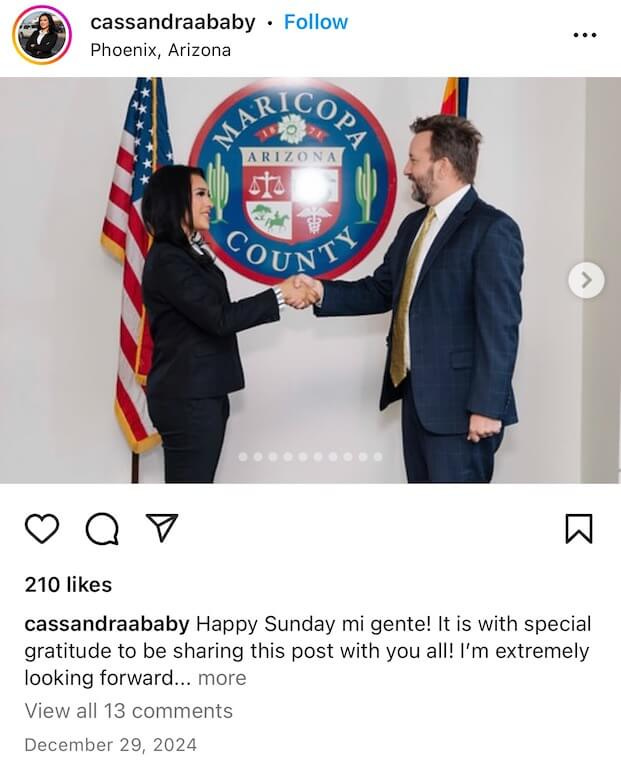Controversy at Cartwright
The Hernandez huddle ... Prop 123 rises from the grave? ... And all hail the robot builders!
Democratic Rep. Lydia Hernandez isn’t new to controversy. It’s followed her at both the state Legislature and on the local school board she heads.
But her position at the Capitol might help her get out of her latest scandal on the Cartwright Elementary School District Governing Board.
This year, a key ally joined Lydia on the school board. Voters elected her daughter, 20-year-old Cassandra Hernandez, to a four-year term on the same board.
That might be illegal.
State law says immediate family members who have lived in the same residence within the past four years can’t serve on the same governing board.
A voter in the district recently filed a lawsuit seeking to oust Cassandra from the board, alleging she lived with her mother within the last four years and is ineligible to hold the office.
But the mother-daughter duo has powerful allies looking out for them at the Capitol.
Democratic Rep. Consuelo Hernandez — no relation to Lydia and Cassandra — successfully added an amendment to one of Lydia’s bills to exempt Cassandra from that law by making it only apply to school board members who are under 20 years old when they’re first elected.
Cassandra turned 20 just after winning her election. The beauty influencer turned school board member commemorated her birthday on her TikTok and Instagram.
The amended bill, HB2883, requires school board members to complete professional development training. Consuelo’s amendment tacks on seemingly unrelated provisions that directly pertain to Lydia’s daughter.
Neither Consuelo nor Lydia responded to our requests for comment, but Lydia brought it up unprompted to us a few weeks ago.
“(Cassandra) moved in with a family,” she said. “They think she lives with me — she does not. And because I’m a board member, it’s kind of thwarting her opportunities because of her relationship with me. But we met all the requirements, and people say it’s unethical?”
She didn’t clarify if Cassandra moved out before she turned 16, which would be the only way she could qualify to run for the office. It’s also worth mentioning that there’d be no need for Lydia’s legislative ally to amend the four-year residency law if it didn’t apply to Cassandra.
The mother-daughter duo has teamed up with longtime ally Rosa Cantu to make big moves at Cartwright. Cantu served on the board with Lydia 20 years ago and was appointed to the board by former Republican Maricopa County Schools Superintendent Steve Watson in 2023.
Together, they control a majority of the Cartwright Governing Board.
At one of the first school board meetings of the year, the trio voted to put interim Superintendent Ema Jáuregui on paid leave without explanation. She worked in the district for 23 years and was named interim superintendent in December.
Community members have taken to meetings in protest of the move, while also calling out Cassandra’s allegedly illegal election.
If the bill is signed into law, the change can’t go into effect until 90 days after the legislative session ends.
By then, Cassandra may not even be on the school board if the lawsuit seeking to invalidate her election is successful.
Retired high school teacher and longtime education advocate Cecilia Moreno filed the lawsuit against the Hernandezes on Jan. 23 citing state law that says the mother and daughter who live together can’t be on the same board. Community advocates are helping cover attorney costs, she said.
“What drove me to it actually was the fact that her daughter, the very first vote on the board, was to terminate the interim superintendent … they didn't give any reason for putting her on leave,” Moreno told us. “And I don't know that (Cassandra) would have been aware of any situation having to do with Ms. Jáuregui if she hadn't discussed it with her mother at home.”
Before taking legal action, community members crowded the school board’s Jan. 16 meeting in adamant opposition to Jáuregui’s forced leave. Speakers said the former superintendent was instrumental in helping kids get hotspots during COVID-19 and has “cultural literacy” fundamental to the district, where the majority of students are Latino.
The duo was served legal paperwork at a school board meeting. They didn’t want to accept it.
Democratic Rep. Anna Abeytia, Lydia’s seatmate at the Legislature and former president of the Cartwright school board, also showed up. The new lawmaker lost reelection to the board last year.
“Given the specific financial and legal risks these actions pose to the district, the clear abuse of power, and the resulting harm of our students, I urge Governing Board President Lydia Hernandez to immediately step down from their role as president and to resign,” she said.
Less than two weeks later, Lydia, Cassandra and Cantu hired Watson, the former county school superintendent who put Cantu on the board, to take over as the district's acting superintendent.
Jáuregui is on paid leave, meaning the district is now paying two superintendents.
Other board members, like Denice Garcia, have abstained from votes on what she called “an illegal board.”
Lydia has served on the school board since 2004. Cassandra attended Cartwright Elementary School, and said in her candidate statement, “I deeply understand our youth’s current challenges because I am living them.” She posts frequently on social media as a beauty influencer and has a YouTube account where she’s posted vlogs ranging from her morning routine to her son’s first dentist appointment.
Cassandra took to Instagram to respond to the allegations of her illegal election to the board and called all of Jan. 16’s speakers “politically connected.”
“I’m beating against the odds on a daily basis being a single young mother … This is extremely sad,” she wrote.
The vote to oust the interim superintendent was Cassandra’s first major controversy on the board.
Her mom has a longer list of past conflicts.
Steve Gallardo, current Maricopa County supervisor and former Democratic state lawmaker, led a recall effort against Lydia in 2010. He previously served on the Cartwright board and was concerned about her involvement in the board’s push to oust Cartwright’s then-superintendent Michael Martinez, who was credited with improving test scores, per the Republic’s archives. Lydia joined two other board members to fire him in December 2010.
And just like in Jáuregui’s case, Lydia refused to divulge the reason for the firing amid public outcry.
Moreno, who filed the lawsuit, said the issues with Lydia’s tenure on the school board have been “constant.”
“Her and another board member, whenever they got their feathers ruffled, they would just get up and walk out, then you no longer have a quorum to vote on things,” Moreno said.
The school board member and state legislator is a moderate Democrat who hasn’t always made friends on her side of the aisle at the Capitol. Last year, for example, Lydia accused several of her fellow Democrats of harassment, intimidation and “false imprisonment” and tried to lodge a criminal complaint against them, saying they wouldn’t let her leave her office unless she supported their legislation.
But letting a Republican with a rocky past in financial management take the reins of the school district is one of Lydia’s more questionable actions.
The Republican lost his reelection campaign in the primary to current Maricopa County Superintendent Shelli Boggs. The Board of Supervisors found Watson mismanaged the office’s finances and had to cover $2 million worth of debt from an unauthorized line of credit.
Lydia gaveled down Moreno for bringing up that financial mismanagement as a speaker at the meeting after his appointment.
Lydia called it a “public attack.”
Still, Moreno got in the last word: “Did you know that (Watson) had allegedly misused funds before you voted for him? And if you did, why would you put this district in jeopardy?”
She has a plan: Two weeks ago, the Governor’s Office told us they didn’t want to negotiate their plans on Prop. 123 in the media. This week, Gov. Katie Hobbs sent out a press release outlining her new plan to renew the proposition, which draws an additional $300 million annually from the state land trust to fund public education and is set to expire in July. It’s basically a renewal of the existing 6.9% draw for another 10 years, rather than increasing the draw to 8.9%, as she proposed last year. Her plan would also bake in a permanent increase to draw at least 5.5%, rather than letting it drop back down to the original 2.5% if voters didn’t reapprove it in 2035.
We have progress: Hobbs’ new Prop 123 plan is much closer to Republicans’ version when it comes to revenue, but the two sides have yet to agree on how the money should be spent, KJZZ’s Wayne Schutsky reports. Republicans have been adamant that it should solely fund “high-performing” teacher salaries, while Hobbs’ plan would devote roughly $200 million to teacher salaries and the other $100 million for general expenses.
“(S)he’s coming in our direction,” Republican Rep. Matt Gress, who sponsored the Republican version, told Schutsky.
We have a timeline?: While election officials warn it’s already too late to call a special election before Prop 123 expires in July, Hobbs still wants to get it done this year. She called on lawmakers to send the question to voters in a special election this November. Others, including Gress, have been skeptical, saying a well-executed campaign takes time, and rushing the issue could backfire. And time is of the essence: Arizona politicians have promised to backfill the funds until they can get a renewal in place. That’ll cost us about $25 million per month as a potential recession looms on the horizon. Meanwhile, recent polling suggests voters are willing to support an extension.
We have future campaign donors: Within hours of Hobbs’ announcement, dozens of business and educational groups – including everyone from the Arizona Chamber of Commerce and Industry to the Arizona Education Association – had signed onto a letter supporting a renewal, though not necessarily Hobbs’ plan.
“While we do not endorse a specific plan or proposal at this time, we strongly encourage collaboration to develop a solution,” they wrote.
Time to go: Hobbs kicked a school choice advocate off the State Board of Education, the Capitol Times’ Kiera Riley reports. Six members of the board are serving on expired terms, but Hobbs decided Jenny Clark, the founder of the advocacy group Love Your School and an outspoken fan of the school voucher program, had to go. Hobbs can appoint new board members, but they must be confirmed by the Senate within a year.
Communist curriculum: Legislative Republicans are mirroring national efforts to end diversity, equity and inclusion programs and promote patriotism in schools, the Republic’s Madeleine Parrish and Helen Rummel report. Republicans are running bills to instruct students about the history of communism, promote “patriotic education,” and teach kids that it’s now called the “Gulf of America.” They also want to require instruction about fetal development (but not sex education).
Not the funding you’re looking for: The U.S. Department of Education yanked back about $16 million from three valley school districts because the grants – which were for teacher pay and recruitment and had “nothing to do with DEI,” per administrators – included the word “equity” in the title. The Osborn, Avondale, and Gadsden school districts all told 12News’ Sean Rice that they were reeling from the cuts and scrambling to find money to make up for it.
“We made a promise to our kids, and unlike the federal government, we don’t break those promises,” Ed Hermes, a member of the Osborn School District Governing Board, told 12News.
Not equitable: Maricopa County Community Colleges shut down its “Equality Maricopa” group which supports LGBTQ+ students and staff, does outreach and provides scholarships, LOOKOUT’s Tori Gantz and Joseph Jaafari report. MCCCD Chancellor Steven Gonzalez also warned that DEI-related positions “whether paid or volunteer” will be reevaluated in the wake of a district-wide audit following the Trump administration’s new executive orders. He also banned employees from using gender pronouns in their email signatures and announced that gender-neutral bathroom signs are coming down, among other changes.
School’s out: The Arizona State Board for Charter Schools is finally shutting down Primavera online charter schools after years of students washing out and the owners making millions in taxpayer dollars, 12News’ Craig Harris reports. At yesterday’s meeting, owner Damian Creamer pleaded with the board to give him more time to turn the schools around, but the board was unswayed, voting to start the process of shutting the schools down with a final vote to come in about three months.
The Arizona Daily Sun reporter Abigail Kessler and photographer Hattie Loper bring us this delightful story of the future robot builders of America.
About 100 Northern Arizona students built autonomous robots to compete in three challenges: following a line around a puzzle map, sumo wrestling to knock another robot out of the ring, and a dance-off.
The teams of students designed, 3D printed and programmed the robots in their engineering classes. It required “a lot of trial and error,” Flagstaff High senior Ethan Overton told Kessler.
“We did a lot of testing as well, trying to push the limits of how fast it could go without sacrificing efficiency and accuracy,” he said. “ ... It took us about a month to fully get this functioning robot to a spot that we were happy with it.”











